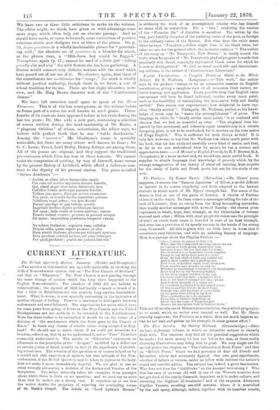The Puritans. By Ernest Myers. (Macmillan.)—Mr. Myers' poem suggests, of
course, the " Samson Agonistes " of Milton, a model difficult to imitate in its severe simplicity, and little adapted to the fervent rhetoric in which much of Mr. Myers' strength lies. The scene of the drama is laid at one of the gates of London. A chorus of Puritan elders is on the watch. To them comes a messenger telling the tale of the sack of Leicester, then an envoy from the King demanding surrender, then finally another messenger with news of Naseby ; the chorus gives expression to wrath, hope, fear, triumph, as the vicissitudes of fortune succeed each other ; Milton with clear prophetic vision sees the principle of truth on which their cause is founded is sure of its final triumph,. and even has a prevision of its speedy success in the hands of the strong man, Cromwell. All this is given with no little force in verse that is sometimes very felicitous, and with an unfailing fluency of language_ Here is a passage about the Pilgrim Fathers
Often, I ween, in pauses of their toil, 'What time the young-eyed morning smote the sea, In coming or forth-going, would they turn, Sad gaze across the sea, and sigh for home ; Yet swerved not so from their severe emprize,
Bating no joy, till in their need WAS born
Hope, the fair child of faith and faithful toil.
And in their sombre sky a guiding star, New-risen, of kindlier omen, leads them now, From wonder unto wonder on and on ; Whether in wanderings southward o'er broad plains, Ne'er trod but by the browsing buffalo, Or the stray simple children of the soil, Choctaws and Cherokees, a homeless host, Eon to the land of summer are they spread And flowery margent of a sunny sea:
Or elsewhere northward by the inland coasts
Of Huron and his fellows fix their home, Strange seas, and unaware of ocean brine Or the great river follow in his flow, Who eastward as he rolls eternally From Erie to Ontario travelling on, Sheer over the verge of Niagara's gulf Heaves his precipitate bulk in thunder down."
This not ill recalls one of Milton's characteristics, the poetical geography, so to speak, which no writer ever treated so well. But Mr. Myers scarcely improves; the Puritans, as a whole, does not much impress us. Can ho not wait and gather up his strength in some greater effort ?


































 Previous page
Previous page